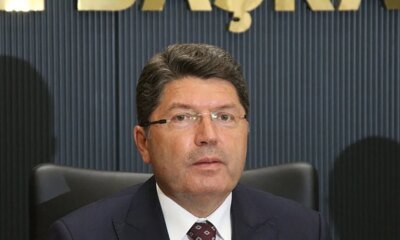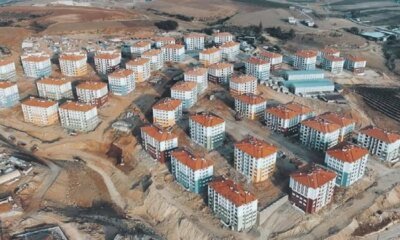Economy
Türkiye sees exports to Africa near $10B in 1st half of 2025
Türkiye has seen its exports to Africa near $10 billion in the first half of 2025, according to the Turkish Exporters’ Assembly (TIM), with Morocco as the top recipient.
Morocco imported $1.8 billion worth of Turkish goods in January-June, leading the continent as improvements in bilateral relations and Türkiye’s proximity continued to boost trade.
Egypt followed with $1.6 billion in imports, while Libya received $1.3 billion. Other key markets included Tunisia with $554.1 million, South Africa with $303.5 million, and Nigeria with $242.3 million.
In terms of growth in value, Türkiye’s exports to Morocco increased by $345 million from the same period last year. Exports to Libya grew by $262 million, the Democratic Republic of Congo by $103 million, Niger by $91.5 million, and Ghana by $68.1 million.
Chemical products topped the list of Türkiye’s exports to the continent, totaling $1.3 billion. This was followed by cereals, grains, oilseeds and derivatives with $1.2 billion, steel with $942.4 million, textiles and raw materials with $675.5 million, and automotive products with $619 million.
Economy
Moody’s upgrades Türkiye’s rating, changes outlook to stable
Moody’s on Friday upgraded Türkiye’s ratings citing a strengthening track record of effective policymaking, easing of inflationary pressures and drop in economic imbalances, while changing the outlook to stable from positive.
The sovereign credit rating was raised from “B1” to “B3a”.
Moody’s said the upgrade reflects the strengthening track record of effective policymaking, more specifically in the central bank’s adherence to monetary policy that durably eases inflationary pressures, reduces economic imbalances, and gradually restores local depositor and foreign investor confidence in the Turkish lira.
The upgrade also reflects the view that the risk of a policy reversal has receded, although it will remain present in the coming years, it said.
The reason for the stable outlook was that it balances upside and downside risks to Türkiye’s credit profile.
“On the upside, extending the track record of effective policymaking without political interference has the potential to support the improvement in Türkiye’s external position more substantially than we currently assume,” Moody’s said.
“Furthermore, the government’s ongoing and planned structural reforms could improve Türkiye’s resilience to external shocks by further reducing its energy import dependence and increasing the competitiveness of exports,” it added.
In July 2024, Moody’s upped Türkiye’s credit ratings by two notches from “B3” to “B1” and changed its outlook to positive, marking its first upgrade for Türkiye in more than a decade.
The credit rating firm’s calendar for this year set the first credit rating review date for Türkiye as Jan. 24, but Moody’s had not made a decision regarding Türkiye’s credit rating at that time.
Economy
Türkiye says defense exports to ‘easily’ exceed $8 billion in 2025
Türkiye’s defense industry exports will exceed $8 billion “easily” in 2025, Trade Minister Ömer Bolat said on Friday, which would mark a new record in shipments that have more than tripled over just four years.
Bolat’s remarks came at the International Defense Industry Fair (IDEF) 2025 in Istanbul, which described as one of the most prestigious and impressive fairs in Türkiye’s history that has now become a global brand.
He said it represents the level of development Türkiye has achieved in the defense industry.
Past restrictions and embargoes have prompted Türkiye to develop a range of homegrown air, land and marine platforms, which eventually helped it seal billions of dollars worth of export deals in recent years.

The localization drive helped raise the domestic share in the defense industry to over 80%, up from just 20% in the early 2000s.
Türkiye’s defense and aerospace exports reached a record of nearly $7.2 billion last year, a nearly 30% increase from the previous year. The figure more than tripled compared to $2.28 billion in 2020.
“We continue to progress each year with increasing momentum,” said Bolat. “In the first six months of this year alone, we have already exceeded $3.5 billion, and sales are accelerating in the second half and toward the final quarter.”

“God willing, we will comfortably surpass $8 billion this year. The defense industry is making a major contribution to Türkiye’s export success,” said the minister.
Contribution to economy
Bolat said the defense industry, through the ecosystem it has established, adds significant value to the overall industry.
More than 3,500 firms operate in the industry, employing a qualified workforce of 100,000.
“We are talking about an annual production figure of $20 billion in the defense industry, and we have a strong defense industry exporting to over a hundred countries worldwide,” said the minister.

He pointed out that the defense industry will develop further, emphasizing that Türkiye is now among the strongest defense industrial countries in the Eurasian region.
“Countries in Africa, Asia, the Middle East, and even Europe, including South America, use Turkish defense industry products,” Bolat noted.
Bolat underlined that this is not merely an economic activity or a foreign currency-earning export effort.
“While it is extremely important from an economic and export perspective, the defense industry is also the guarantor of our independence. In recent years, we have witnessed intense wars, battles, and conflicts in the north, south, east and west of us. Amidst all that, Türkiye continues to develop like a pillar of stability, an island of peace,” he noted.

He attributed that to what he described as “strong army, strong economy, strong defense industry, strong leadership, and strong governance.”
“When you falter or face internal strife and unrest, progress halts and unfortunately, regression begins. For the past 20 years, Türkiye has been steadily advancing and developing, maintaining its rise and shining like a star in the Eurasian region,” Bolat added.
Economy
Meta to ban political ads in EU over ‘unworkable’ rules
Facebook and Instagram owner Meta announced on Friday that it will be forced to ban political advertising across its platforms in the European Union starting in October, citing what it described as “unworkable” regulations imposed by the bloc.
The EU has a bolstered legal armoury to rein in Big Tech, against which Meta has hit out with the support of the U.S. administration under President Donald Trump.
“This is a difficult decision – one we’ve taken in response to the EU’s incoming Transparency and Targeting of Political Advertising (TTPA) regulation,” the company said.
Political, electoral and social issue advertising will no longer be allowed from October in the bloc, it said, because of “unworkable requirements” under the new rules.
“Unfortunately, the TTPA introduces significant, additional obligations to our processes and systems that create an untenable level of complexity and legal uncertainty for advertisers and platforms operating in the EU,” Meta added.
The EU says its political advertising rules seek to increase transparency in online advertising after Facebook’s Cambridge Analytica scandal, which came to light in 2018.
Cambridge Analytica was a consulting firm that was found to have improperly accessed personal data from millions of Facebook users for targeted political advertising, particularly during the 2016 U.S. election and Brexit referendum.
The change is set to impact Meta’s flagship platforms Facebook and Instagram, as well as WhatsApp – which is largely ad-free but announced in June it would be introducing new advertising features in some parts of the app.
Meta said it was “not the only company to have been forced into this position.”
Google last year announced it would also prevent political advertising in the EU from October 2025 because of the “significant new operational challenges and legal uncertainties.”
Meta CEO Mark Zuckerberg has been highly critical of European rules, accusing Brussels in January of “censorship” and equating EU fines against the company to tariffs.
The latest row between Meta and the EU has been over the firm’s “pay or consent” system.
The EU imposed a 200 million euro ($235 million) fine in April after concluding Meta violated rules on the use of personal data on Facebook and Instagram.
The company faces additional daily penalties if it does not make changes, with Brussels yet to decide whether Meta has modified the platforms enough to avoid more fines.
Facebook and Instagram also face investigations under the EU’s mammoth content moderation law known as the Digital Services Act.
Economy
Türkiye, Syria talk banking, insurance co-op amid reconstruction push
Representatives from Türkiye’s Treasury and banking sector met with Syrian officials to explore potential cooperation in banking, insurance and public finance as part of broader efforts to support the war-torn nation’s reconstruction.
The meetings included officials from Türkiye’s Treasury and Finance Ministry, the Banks Association of Türkiye (TBB) and the Participation Banks Association of Türkiye (TKBB), according to a social media post by Syrian Finance Minister Yisr Barnieh and sources familiar with the matter.
The meetings are said to have been held in recent days in Damascus. On the Syrian side, representatives from the Finance and Interior Ministries as well as the Central Bank of Syria attended the talks.
“We reviewed opportunities to benefit from Türkiye’s expertise and experience in support of Syria’s fiscal reform efforts, especially in enhancing public finance capacity,” Barnieh said.
“We also discussed accelerating the provision of correspondent banking services by Turkish banks to Syrian banks and evaluated potential licensing opportunities for Turkish banks, insurers and financial services firms to operate in Syria.”
Barnieh added that the two countries agreed to establish joint working committees under their respective finance ministries to follow up on the discussed matters.
The talks also covered Interior Ministry-related topics, particularly Türkiye’s potential technical assistance in securing identity documents.
A source familiar with the discussions told Reuters that the meetings were constructive, with positive momentum toward transferring Türkiye’s banking sector knowledge and offering various forms of support to Syria.
Prior to the Syrian civil war, Türkiye’s largest lender, Ziraat Bank, had been in talks to establish a bank in Syria with a local partner in 2010, but those plans were suspended with the onset of the conflict. Currently, no Turkish banks operate in Syria.
Following the ousting of longtime dictator Bashar Assad in December, Ziraat Bank General Manager Alpaslan Çakar had told Reuters that the bank would be ready to take on responsibility in Syria if conditions allowed.
Broader reconstruction-focused talks are ongoing between Türkiye and the Syrian interim government, particularly in sectors such as energy and infrastructure, as part of efforts to stabilize and rebuild the war-torn country.
Economy
Türkiye can prove climate ambition, growth go hand in hand: UN official
Türkiye has the potential to emerge as a regional leader by showing how ambitious climate action can fuel economic growth, enhance energy security and draw international investment, according to the U.N.’s top climate official.
“Türkiye can lead by example, especially within the region, by showing how climate targets go hand-in-hand with economic growth,” Simon Stiell, executive secretary of the U.N. Framework Convention on Climate Change (UNFCCC), said.
“Türkiye has unique advantages – huge capacity for wind and solar, vibrant small and medium enterprises, and a young population. These advantages, combined with stronger targets, are a recipe for success,” Stiell told Anadolu Agency (AA).
Türkiye has limited oil and natural gas resources and suffers from a high current account deficit due to vast energy imports.
Over the past two decades, it has significantly diversified its energy resources, mainly aimed at reducing its heavy external dependence while helping it develop its domestic capabilities.
It has been incentivizing investments in renewable power plants since 2005 to reduce its high import bill and insulate itself from geopolitical risks.
Stiell, speaking about his visit to Türkiye this week, praised the country’s clean energy progress, stressing that it is well-positioned for further steps through a new national climate plan.
He urged Türkiye to build on its current clean energy momentum and submit an enhanced Nationally Determined Contribution (NDC) this year.
“In 2024, Türkiye was in the top 10 countries with the largest absolute solar capacity additions,” he said.
“A more ambitious NDC, a new national climate plan and targets, would send a strong signal to global investors that Türkiye is committed to accelerating the transformation in its energy and power sectors – going further and faster to meet rising demand.”
While Türkiye’s electricity consumption has tripled in the last two decades, it is expected to increase even faster in the coming years due to the long-term energy transformation, which involves replacing fossil fuel energy with electricity.
The country boasts more than 33 gigawatts (GW) installed capacity in wind and solar energy. It plans to lift this figure to 120 GW by 2035, according to the government’s targets.
Türkiye aims at reducing greenhouse gas emissions in line with its commitment to become a net-zero emission economy by 2053.
Stiell noted that stronger climate commitments could yield wide-ranging benefits: “It can save billions of dollars through reduced fossil fuel imports, creating hundreds of thousands of jobs, all while reducing its current account deficit, which will have very positive implications for the economy.
“In 2023, Türkiye attracted $1.4 billion for non-hydro renewables. Solar, wind, and hydrogen are all poised to take off.”
According to Stiell, the submission of a strengthened NDC is “a real opportunity” to boost energy independence and create lasting economic growth.
Transition leadership
Stiell highlighted the global shift toward clean energy and said countries that invest early are already seeing significant returns.
“Germany’s energy transition created a large clean energy workforce. Morocco’s solar investments positioned it as a regional energy leader,” he said. “India wants to become a solar superpower. Nigeria sees huge opportunities across society to reduce dependence on diesel generators.”
He also emphasized the central role of the private sector.
“The private sector’s role is particularly important, and the returns for the private sector stand to be significant, across every major economy,” he said.
A just transition must also remain a priority: “A just transition plan, including retraining and investment in affected communities, is also essential. Türkiye can lead the world in ensuring no worker or community associated with the fossil fuel industry is left behind.”
On whether tougher climate targets pose an economic burden, Stiell pointed to the importance of international cooperation and financial mechanisms.
“International climate finance, technology partnerships, and regional cooperation are key. Access to EU climate-linked funding can help reduce upfront transition costs. Clear policy frameworks and stronger NDCs can also unlock investment from the private sector by improving market confidence and reducing regulatory risk,” he said.
He also pointed to the role of Türkiye’s Emissions Trading System (ETS) in supporting competitiveness.
In other countries, similar carbon pricing mechanisms have generated revenues that are reinvested to fund clean energy efforts, he noted.
Business readiness, climate resilience
During his two-day visit to Türkiye that wrapped up Wednesday, Stiell met with Turkish civil society and business leaders, noting strong enthusiasm and readiness to contribute to the country’s green transition.
“On my trip I’ve heard how clear policies and climate ambition can support national growth, drive innovation, and create export opportunities. The private sector in this country is dynamic. Early action gives companies a competitive edge in global markets,” he said.
“And it isn’t just about existing energy – Turkish companies have all the tools to become a leader in new forms of green technology and manufacturing.”
Stiell also stressed the importance of policymaking that includes civil society, especially youth.
“Their representation in climate action and policymaking will ensure NDCs are well-aligned with national and local needs, and ensure that the most vulnerable segments of society, including women, youth, and poorer people, participate and benefit from the transition,” he said.
Stronger climate targets, he added, must also focus on adaptation and resilience.
“Stronger NDCs help direct investment not only into emissions reduction but also into building resilience. Türkiye is already facing serious climate risks, including wildfires and water scarcity,” he said.
“A well-designed national climate plan can support early warning systems, disaster risk reduction, drought and wildfire management, and climate-resilient infrastructure, which are essential for safeguarding hard-won economic gains and achieving long-term development targets.”
Stiell welcomed Türkiye’s progress on a national adaptation strategy and said sharing lessons with other nations will be key.
“A new national strategy on adaptation, launched last year, can help build momentum, and the submission of a National Adaptation Plan to the U.N. can help other countries learn lessons about what works.”
Economy
Trump, Powell clash over renovation costs during tense Fed visit
After months of sharp criticism, President Donald Trump took his feud with Federal Reserve Chair Jerome Powell to the Fed’s front door on Thursday, publicly rebuking him over the escalating costs of a long-planned building project. Powell pushed back, disputing the president’s latest price tag as incorrect.
Wearing hard hats and grim faces, standing in the middle of the construction project, Trump and Powell addressed the cameras. Trump charged that the renovation would cost $3.1 billion, much higher than the Fed’s $2.5 billion figure. Powell, standing next to him, shook his head.
The Fed chair, after looking at a paper presented to him by Trump, said the president was including the cost of renovating a separate Fed building, known as the Martin building, which was finished five years ago.
The visit represented a significant ratcheting up of the president’s pressure on Powell to lower borrowing costs, which Trump says would accelerate economic growth and reduce the government’s borrowing costs.
Presidents rarely visit the Fed’s offices, though they are just a few blocks from the White House, an example of the central bank’s independence from day-to-day politics.
“We have to get the interest rates down,” Trump said later after a short tour, addressing the cameras this time without Powell. “People are pretty much unable to buy houses.”
Trump is likely to be disappointed next week, however, when Fed officials will meet to decide its next steps on interest rates. Powell and other officials have signaled they will likely keep their key rate unchanged at about 4.3%. However, economists and Wall Street investors expect the Fed may start cutting rates in September.
Trump did step back a bit from some of his recent threats to fire Powell before his term ends May 26. Asked if the rising costs of the Fed’s renovation, estimated in 2022 to cost $1.9 billion, was a “fireable offense,” Trump said, “I don’t want to put this in that category.”
“To do that is a big move, and I don’t think that’s necessary,” Trump added. “I just want to see one thing happen, very simple: Interest rates come down.”
The Fed allowed reporters to tour the building before the visit by Trump, who, in his real estate career, has bragged about his lavish spending on architectural accoutrements that gave a Versailles-like golden flair to his buildings.
On Thursday, reporters wound through cement mixers, front loaders, and plastic pipes as they got a close-up view of the active construction site that encompasses the Fed’s historic headquarters, known as the Marriner S. Eccles building, and a second building across 20th Street in Washington.
Fed staff, who declined to be identified, said that greater security requirements, rising materials costs and tariffs, and the need to comply with historic preservation measures drove up the cost of the project, which was budgeted in 2022 at $1.9 billion.
The staff pointed out new blast-resistant windows and seismic walls that were needed to comply with modern building codes and security standards set out by the Department of Homeland Security. The Fed has to build with the highest level of security in mind, Fed staff said, including something called “progressive collapse,” in which only parts of the building would fall if hit with explosives.
Sensitivity to the president’s pending visit among Fed staff was high during the tour. Reporters were ushered into a small room outside the Fed’s boardroom, where 19 officials meet eight times a year to decide whether to change short-term interest rates. The room, which will have a security booth, is oval-shaped, and someone had written “oval office” on plywood walls.
The Fed staff downplayed the inscription as a joke. When reporters returned to the room later, it had been painted over.
During the tour, Fed staff also showed the elevator shaft that congressional critics have said is for “VIPs” only. Powell has since said it will be open to all Fed staff.
The renovation includes an 18-inch (45-cm) extension so the elevator reaches a slightly elevated area that is now accessible only by steps or a ramp. A planning document that said the elevator will only be for the Fed’s seven governors was erroneous and later amended, staff said.
Plans for the renovation were first approved by the Fed’s governing board in 2017. The project then wended its way through several local commissions for approval, at least one of which, the Commission for Fine Arts, included several Trump appointees. The commission pushed for more marble in the second of the two buildings the Fed is renovating, known as 1951 Constitution Avenue, specifically in a mostly glass extension that some of Trump’s appointees derided as a “glass box.”
Fed staff also said tariffs and inflationary increases in building material prices drove up costs. Trump in 2018 imposed a 25% duty on steel and 10% on aluminum. He increased them this year to 50%. Steel prices are up about 60% since the plans were approved, while construction materials costs overall are up about 50%, according to government data.
Fed staff also pointed to the complication of historic renovations – both buildings have significant preservation needs. Constructing a new building on an empty site would have been cheaper, they said.
As one example, the staff pointed reporters to where they had excavated beneath the Eccles building to add a floor of mechanical rooms, storage space, and some offices. The Fed staff acknowledged such structural additions underground are expensive, but said it was done to avoid adding HVAC equipment and other mechanics on the roof, which is historic.
The Fed has previously attributed much of the project’s cost to underground construction. It is also adding three underground levels of parking for its second building. Initially the central bank proposed building more above ground, but ran into Washington, D.C.’s height restrictions, forcing more underground construction.
-

 Daily Agenda3 days ago
Daily Agenda3 days ago5 years ago today survived the Hagia Sophia Mosque chains
-

 Refugees3 days ago
Refugees3 days agoTurkey mourns 5 volunteer firefighters killed battling wildfires
-

 Politics3 days ago
Politics3 days agoCease-fire key to peace at Türkiye-Russia-Ukraine talks: Fidan
-

 Sports3 days ago
Sports3 days agoArda Güler left in cold as Mbappe snatches Real Madrid’s No. 10
-

 Sports3 days ago
Sports3 days agoGalatasaray flex firepower, top Cagliari 3-1 in preseason clash
-

 Daily Agenda3 days ago
Daily Agenda3 days agoMinister of Justice Yılmaz Tunç: A deliberate smear campaign is being carried out
-

 Economy2 days ago
Economy2 days agoMeta to ban political ads in EU over ‘unworkable’ rules
-

 Daily Agenda2 days ago
Daily Agenda2 days agoEarthquake houses are rising rapidly – Breaking News




